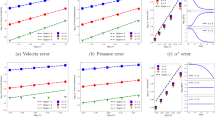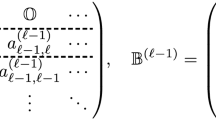Abstract
By combining grad-div stabilization used for improving pressure-robustness and full domain partition used for parallelization, a new parallel finite element method for the steady Navier–Stokes problem with friction boundary conditions is developed and analyzed. Within this parallel procedure, each processor assigned with one subdomain uses a composite grid to calculate a local approximation solution in its own subdomain, making the method simple and easy to carry out on the basis of existing sequential solver excluding a lot of effort in recoding on the top of existing serial software. We rigorously derive the uniform error estimates concerning the fine grid size h, the viscosity \(\mu \) and stabilization parameter \(\alpha \) for the velocity, gradient of velocity and pressure in \(L^2\) norms and for the pressure in \(H^{-1}\) norm for the standard grad-div stabilized method. On the basis of the derived uniform error estimates and local a priori estimate for grad-div stabilized solution, we further give the uniform error estimates for the local and parallel grad-div stabilized methods. It is shown theoretically and numerically that our present method can reduce the influence of pressure on the error of velocity when the viscosity \(\mu \) is small. Specifically, it can yield better approximate velocity than its counterpart excluding grad-div stabilization. The smaller the viscosity coefficient, the higher improvment in accuracy of the approximate velocity. Besides, it can provide approximate solutions for the velocity and pressure with the same basically precision and convergence rate as the ones calculated by the standard grad-div stabilized method with a massive decrease in CPU time.








Similar content being viewed by others
Data availability
The datasets generated during the current study are available from the corresponding author on reasonable request.
References
Fujita, H., Kawarada, H.: Variational inequalities for the Stokes equation with boundary conditions of friction type. Recent Dev. Domain Decompos. Methods Flow Probe 11, 15–33 (1998)
Evans, A.: Partial Differential Equations. American Mathematical Society, Providence (1998)
Temam, R.: Navier–Stokes Equations: Theory and Numerical Analysis. North-Holland, Amsterdan (1984)
Girault, V., Raviart, P.: Finite Element Methods for Navier–Stokes Equations: Theory and Algorithms. Springer, Berlin (1986)
John, V.: Finite Element Methods for Incompressible Flow Problems. Springer Series in Computational Mathematics, Springer, Cham (2016)
Hu, X., Mu, L., Ye, X.: A weak Galerkin finite element method for the Navier–Stokes equations. J. Comput. Appl. Math. 362, 614–625 (2019)
Feng, X., Lu, X., He, Y.: Difference finite element method for the 3D steady Navier–Stokes equations. SIAM J. Numer. Anal. 61, 167–193 (2023)
Xu, J., Zhou, A.: Local and parallel finite element algorithms based on two-grid discretizations. Math. Comput. 69, 881–909 (2000)
He, Y., Xu, J., Zhou, A., Li, J.: Local and parallel finite element algorithms for the Stokes problem. Numer. Math. 109, 415–434 (2008)
He, Y., Xu, J., Zhou, A.: Local and parallel finite element algorithms for the Navier–Stokes problem. J. Comput. Math. 24, 227–238 (2006)
Shang, Y., He, Y.: Parallel iterative finite element algorithms based on full domain partition for the stationary Navier–Stokes equations. Appl. Numer. Math. 60, 719–737 (2010)
Tang, Q., Huang, Y.: Analysis of parallel finite element algorithm based on three linearization methods for the steady incompressible MHD flow. Comput. Math. Appl. 78, 35–54 (2019)
Zheng, B., Qin, J., Shang, Y.: Stability and convergence of some parallel iterative subgrid stabilized algorithms for the steady Navier–Stokes equations. Adv. Comput. Math. 48, 35 (2022)
Zhou, K., Shang, Y.: Parallel iterative stabilized finite element algorithms for the Navier–Stokes equations with nonlinear slip boundary conditions. Int. J. Numer. Methods Fluids 93, 1074–1109 (2021)
Ran, H., Zheng, B., Shang, Y.: A parallel finite element variational multiscale method for the Navier–Stokes equations with nonlinear slip boundary conditions. Appl. Numer. Math. 168, 274–292 (2021)
Zheng, B., Shang, Y.: Parallel defect-correction methods for incompressible flows with friction boundary conditions. Comput. Fluids 251, 105733 (2023)
Franca, L., Hughes, T.: Two classes of mixed finite element methods. Comput. Methods Appl. Mech. Eng. 69, 89–129 (1988)
John, V., Linke, A., Merdon, C., Neilan, M., et al.: On the divergence constraint in mixed finite element methods for incompressible flows. SIAM Rev. 59, 492–544 (2017)
Linke, A., Rebholz, L.: On a reduced sparsity stabilization of grad-div type for incompressible flow problems. Comput. Methods Appl. Mech. Eng. 261, 142–153 (2003)
Olshanskii, M., Reusken, A.: Grad-div stablilization for Stokes equations. Math. Comput. 73, 1699–1718 (2004)
Layton, W., Manica, C., Neda, M., Olshanskii, M., et al.: On the accuracy of the rotation form in simulations of the Navier–Stokes equations. J. Comput. Phys. 228, 3433–3447 (2009)
de Frutos, J., Garcia-Archilla, B., John, V., Novo, J.: Grad-div stabilization for the evolutionary Oseen problem with inf-sup stable finite elements. J. Sci. Comput. 66, 991–1024 (2016)
de Frutos, J., García-Archilla, B., John, V., Novo, J.: Analysis of the grad-div stabilization for the time-dependent Navier–Stokes equations with inf-sup stable finite elements. Adv. Comput. Math. 44, 195–225 (2018)
Fiordilino, J., Layton, W., Rong, Y.: An efficient and modular grad-div stabilization. Comput. Methods Appl. Mech. Eng. 335, 327–346 (2018)
Rong, Y., Fiordilino, J.: Numerical analysis of a BDF2 modular grad-div stabilization method for the Navier–Stokes equations. J. Sci. Comput. 82, 66 (2020)
Lu, X., Huang, P.: A modular grad-div stabilization for the 2D/3D nonstationary incompressible magnetohydrodynamics equations. J. Sci. Comput. 82, 3 (2020)
Jiang, Y., Zheng, B., Shang, Y.: A parallel grad-div stabilized finite element algorithm for the Stokes equations with damping. Comput. Math. Appl. 135, 171–192 (2023)
Jenkins, E., John, V., Linke, A., Rebholz, L.: On the parameter choice in grad-div stabilization for Stokes equations. Adv. Comput. Math. 40, 491–516 (2014)
Ahmed, N.: On the grad-div stabilization for the steady Oseen and Navier–Stokes equations. Calcolo 54, 471–501 (2017)
Fujita, H.: Flow problems with Unilateral Boundary Conditions. Lecons, Collège de France (1993)
Li, Y., Li, K.: Uzawa iteration method for Stokes type variational inequality of the second kind. Acta Math. Appl. Sin. Engl. Ser. 27, 303–316 (2011)
Fujita, H.: A mathematical analysis of motions of viscous incompressible fluid under leak or slip boundary conditions. RIMS Kokyuroku 888, 199–216 (1994)
Fujita, H.: Non-stationary Stokes flows under leak boundary conditions of friction type. J. Comput. Math. 19, 1–8 (2001)
Fujita, H.: A coherent analysis of Stokes flows under boundary conditions of friction type. J. Comput. Appl. Math. 149, 57–69 (2002)
Saito, N.: On the Stokes equations with the leak and slip boundary conditions of friction type: regularity of solutions. Publ. RIMS Kyoto Univ. 40, 345–384 (2004)
Le Roux, C.: Steady Stokes flows with threshold slip boundary conditions. Math. Models Methods Appl. Sci. 15, 1141–1168 (2005)
Li, Y., Li, K.: Existence of the solution to stationary Navier–Stokes equations with nonlinear slip boundary conditions. J. Math. Anal. Appl. 381, 1–9 (2011)
Li, Y., Li, K.: Global strong solutions of two-dimensional Navier–Stokes equations with nonlinear slip boundary conditions. J. Math. Anal. Appl. 393, 1–13 (2012)
Kashiwabara, T.: On a strong solution of the non-stationary Navier–Stokes equations under slip or leak boundary conditions of friction type. J. Differ. Equ. 254, 756–778 (2013)
Li, Y., An, R.: Two-level pressure projection finite element methods for Navier–Stokes equations with nonlinear slip boundary conditions. Appl. Numer. Math. 61, 285–297 (2011)
Li, Y., An, R.: Penalty finite element method for Navier–Stokes equations with nonlinear slip boundary conditions. Int. J. Numer. Methods Fluids 69, 550–566 (2012)
Li, Y., An, R.: Two-level variational multiscale finite element methods for Navier–Stokes type variational inequality problem. J. Comput. Appl. Math. 290, 656–669 (2015)
Djokoa, J., Kokob, J.: Numerical methods for the Stokes and Navier–Stokes equations driven by threshold slip boundary conditions. Comput. Methods Appl. Mech. Eng. 305, 936–958 (2016)
Diokoa, J.: A priori error analysis for Navier–Stokes equations with slip boundary conditions of friction type. J. Math. Fluid Mech. 21, 1 (2019)
Qiu, H., An, R., Mei, L., Xue, C.: Two-step algorithms for the stationary incompressible Navier–Stokes equations with friction boundary conditions. Appl. Numer. Math. 120, 97–114 (2017)
Jing, F., Han, W., Yan, W., Wang, F.: Discontinuous Galerkin methods for a stationary Navier–Stokes problem with a nonlinear slip boundary condition of friction type. J. Sci. Comput. 76, 888–912 (2018)
Zheng, B., Shang, Y.: A three-step defect-correction algorithm for incompressible flows with friction boundary conditions. Numer. Algor. 91, 1483–1510 (2022)
Chen, Z.: Finite Element Methods and Their Applications. Springer, Heidelberg (2005)
Hecht, F.: New development in FreeFem++. J. Numer. Math. 20, 251–265 (2012)
He, Y., Li, L.: Convergence of three iterative methods based on the finite element discretization for the stationary Navier–Stokes equations. Comput. Methods Appl. Mech. Eng. 198, 1351–1359 (2009)
Acknowledgements
The authors would like to express their deep gratitude to the anonymous reviewer and editor who made valuable suggestions and comments for revision and improvement of the manuscript.
Funding
This work was supported by the Natural Science Foundation of Chongqing Municipality, China (No. cstc2021jcyj-msxmX1044).
Author information
Authors and Affiliations
Corresponding author
Ethics declarations
Conflict of interest
The authors declare no conflict of interest.
Additional information
Publisher's Note
Springer Nature remains neutral with regard to jurisdictional claims in published maps and institutional affiliations.
Rights and permissions
Springer Nature or its licensor (e.g. a society or other partner) holds exclusive rights to this article under a publishing agreement with the author(s) or other rightsholder(s); author self-archiving of the accepted manuscript version of this article is solely governed by the terms of such publishing agreement and applicable law.
About this article
Cite this article
Zheng, B., Ran, H. & Shang, Y. Analysis of a Parallel Grad-Div Stabilized Method for the Navier–Stokes Problem with Friction Boundary Conditions. J Sci Comput 99, 81 (2024). https://doi.org/10.1007/s10915-024-02541-1
Received:
Revised:
Accepted:
Published:
DOI: https://doi.org/10.1007/s10915-024-02541-1
Keywords
- Navier–Stokes problem
- Friction boundary conditions
- Grad-div stabilization
- Finite element
- Full domain partition
- Parallel algorithm




